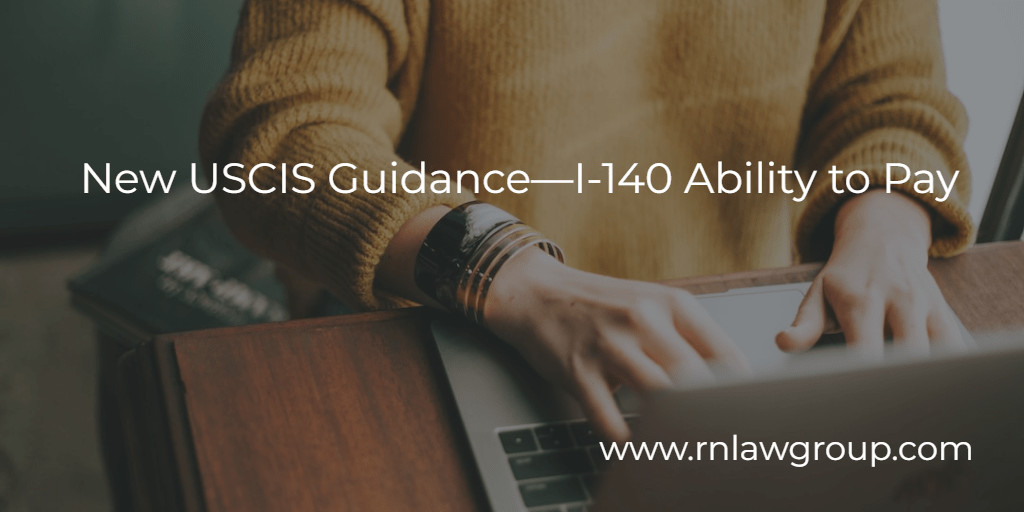
New USCIS Guidance—I-140 Ability to Pay
On March 15, 2023, USCIS issued clarifying policy guidance related to the Service’s analysis of an I-140 sponsor/employer’s ability to pay the proffered wage for certain EB-1, and EB-2 and EB-3 employment-based visa classification petitions. Generally, this new policy guidance formalizes previously understood USCIS methodologies while establishing certain new documentary criterion which on the balance tends to be more favorable to I-140 sponsors by mandating USCIS take a larger “totality of the circumstances” approach to adjudication.
What is required for Form I-140 Approval?
Along with demonstrating the Alien possesses the requisite level of education and experience, an employer filing an Immigrant Petition for Alien Workers (Form I-140) must establish that the job offered to the beneficiary is a bona fide job, realistic opportunity; the petitioner’s ability to pay the proffered wage indicated on Form I-140 is one of the essential elements in evaluating whether the job offer is realistic.
I-140 Ability to Pay: Priority Date and Proffered Wage
As a matter of background, the vast majority of employment-based immigrant visa petitions require a Labor Certification (PERM ETA 9089) which among other things identifies the proposed or “proffered” salary, i.e. the wage offered to the Alien pursuant to the green card job opportunity. The Labor Certification (PERM ETA 9089) also sets the “priority date” of the Green Card case; the “priority date” is set on the date of filing the Labor Certification (PERM ETA 9089) with the Department of Labor. While the priority date has a number of important meanings, for our purposes the priority date is the date from which USCIS will make all determinations of the sponsoring employer’s ability to pay the sponsored employee’s wages. For approval of an employment-based immigrant visa petitions, the sponsoring employer must demonstrate its continuing ability to pay the Alien’s proffered wage from the priority date of the Alien’s Labor Certification (PERM ETA 9089) until the Alien obtains Lawful Permanent Resident, also known as Green Card status.
How is Ability to Pay Demonstrated?
Typically, sponsoring employers demonstrate their the ability to pay requirements at the time of filing the employment-based immigrant visa petitions (Form I-140) by submitting certain types of initial required evidence (such as federal tax returns, audited financial statements, or annual reports) along with payroll records demonstrating that, during the relevant time period in question, sponsoring employer has been paying the employee at least the proffered wage. However, in certain circumstances where USCIS does not view this initially submitted is sufficient to demonstrate this ability to pay requirement, the Service may and often does issue a Request for Evidence (RFE) requesting a more clarified or diligent demonstration of this ability to pay. Often times, a determination of ability to pay can be the sole factor enabling or preventing a company’s acquisition of highly skilled foreign talent.
What’s in USCIS’ new Ability to Pay Policy Guidance?
Recognizing our country is safer, stronger, and more prosperous with a fair and orderly immigration system that welcomes immigrants while enabling US employers to capitalize upon the world labor market, and consistent with the current White House administration’s stated priorities to reform the long-broken and chaotic immigration system, USCIS’ March 15, 2023 Policy Guidance Update clarifies long-standing uncertainties while providing employer-friendly guidance to adjudicators to take a more holistic, “totality of the circumstances” approach on more “difficult” cases. Typically, a company will very rarely have an issue with ability to pay. However, the new guidance seeks to further enable US employers’ capitalization of the world labor market in difficult immigration cases where an ability to pay determination under previous guidance may likely have been negative.
In the new Policy Guidance, we have identified a number of noticeable new points of clarification or policy direction, further detailed below:
- USCIS has implicitly directed adjudicators to take a larger, positive emphasis on “totality of circumstances” adjudications in situations where the ability to pay is less than clear on the face of the documentation of record;
- USCIS clarifies that Federal Tax Returns, Annual Reports, or Audited Financial Statements must be submitted as initial evidence of ability to pay;
- For company’s employing 100 or more workers, in lieu of Federal Tax Returns, Annual Reports, or Audited Financial Statements, USCIS will accept a letter from a financial officer of the company attesting to the company’s ability to pay while reserving the right to issue Request(s) for Evidence (RFE) on a case by case basis; new guidance also identifies but does not limit the “financial officer” entitled to author this letter (such as but not limited to Chief Financial Officer, Principal Financial Officer, Vice President of finance, chief accounting officer, treasurer, comptroller, or financial director);
- USCIS will allow for discretion and will generally accept “poor” tax returns numbers combined with a “better” unaudited financial statement as sufficient for ability to pay purposes; IRS accounting and GAAP accounting are different methodologies providing different results;
- When a subsidiary seeks to utilize its parent company’s financial documents for purposes of demonstrating the subsidiary’s ability to pay, USCIS will take a kinder eye if the subsidiary’s financial data is separately detailed in those documents;
- USCIS formalizes Matter of X, a decision of the Administrative Appeals Office) where USCIS will allow for a combination of W-2 wages plus the company’s income OR assets to hit the required ability to pay amount [have seen RFEs in the past that state Matter of X is dicta and not binding precedent];
- To show ability to pay, USCIS will allow for a prorating of proffered wages for the year in which the priority date falls; when attempting to do so, the net income for that year shall be prorated from the priority date as well—the same will NOT apply for net assets or W-2 wages paid;
- Certain times, USCIS may request a sponsoring employer demonstrate an ability to pay the proffered wages of all its immigrant visa (Form I-140 beneficiaries) for the approval of the single, immediate I-140 filing. When doing so, the sponsoring employer shall only be required to demonstrate this company-wide ability to pay from the priority date year of the single, immediate I-140 filing, rather than going back to the earliest available priority date for any of the Petitioner’s I-140 beneficiaries as has been USCIS practice in the past
- Details additional relevant “totality of circumstance” factors, such as the use of bank account statements, company personnel records, the income and assets of other legal entities, examinations of credit limits and lines, use of gross sales and/or revenues, total wages paid to current employees, longitudinal analysis of the company’s grown or changes in the business structure, etc.
This new policy guidance does not create any large operational changes—if anything the policy guidance seeks to be immigrant and immigrant sponsor friendly while providing practical clarity to immigration practitioners and employer sponsors alike. In light of the new guidance, employers must realize that before embarking upon the onerous and intensive Labor Certification and Green Card process, it is critical to properly educated and conduct the necessary diligence with regard their ability to pay the wages offered to its sponsored employees.
For more information, or for a detailed conversation regarding your ability to pay issues, please schedule a time to speak here.
By: Ryan A. Wilck, Partner and Attorney at Law
Ryan Wilck is a Managing Partner and attorney at Reddy Neumann Brown PC with over a decade of US immigration law experience, enthusiastic and proactive in his approach assisting clients and their employees through the various phases of the permanent residency a/k/a Green Card process. “Concilio et labore” is not only the motto of Ryan’s favorite sports club but is also his life’s motto; all things come through wisdom and effort. Ryan is passionate about gaining the trust of his clients by utilizing a relentless and detail-oriented approach to understand their specific goals and concerns, hoping to instill a sense of confidence and stability. Whatever your immigration problem or interest, he and his team will find a solution, through wisdom and effort. Reddy Neumann Brown PC has been serving the business community for over 20 years and is Houston’s largest immigration law firm focused solely on employment-based business immigration. We work with employers and their employees, helping navigate the complex immigration process efficiently and cost-effective.
We are committed to assisting our clients with navigating the complex PERM Labor Certification (ETA 9089 and other challenging immigration matters as an accomplished immigration law firm in Houston, Texas. Our team is here to offer the direction and support you require, whether you’re a company trying to hire top talent or a foreign worker seeking to develop a career in the United States. To find out more about how we can help you with your immigration issues, get in touch with us right away.

